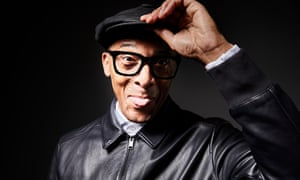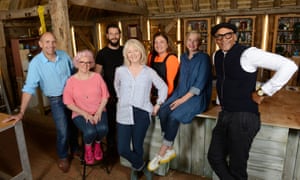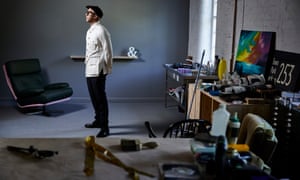The Repair Shop is about many things. People bring items to its picturesque thatched barn workshop to be brought back to life in front of the BBC show’s cameras. It’s about the skill and meticulousness of the restorers’ work, a chance to see the inner workings of an object, an echo of a time when we fixed things instead of buying new. One less thing destined for landfill.
Mostly, says Jay Blades, The Repair Shop’s presenter, without a hint of sentimentality, it’s “about love”. It’s about loss, and memory, and how objects once cherished by loved ones can carry huge weight for those left behind. Some of the grief is still raw and recent. It’s also about new beginnings, he says. “How if something’s broken, you can put it back together. And sometimes that’s quite a metaphor for us in life – that if we’re broken, we need to know how we can fix ourselves.” Blades knows a lot about that.
The show has become a bit of a phenomenon (it pulls in 6.5 million viewers, and new episodes start this week), for all those reasons. Has its success surprised him? “I kind of knew from the beginning that it was something really special,” he says. Clocks tick again, teddy bears are resuscitated, great-grandparents’ treasures are stripped of decades of paint, grime and benign neglect, and restored to glory. “Some objects that come in, you might think: ‘What is that?’ But when you hear the story behind them, and you hear the emotion, you cannot help but be part of that story.”
During the pandemic, especially, there has been something comforting in The Repair Shop’s gentle pace and ethos of helping people. Unlike, say, The Antiques Roadshow, there is never a monetary value associated with the objects. They are, says Blades, “so entrenched with someone from their family, how could you put a price on that?”

While many of us have become enamoured of internet shopping, others have started to buy less as a result of the pandemic. Will that last? Blades, although optimistic by nature – he has a positive energy that crackles down the phone line – isn’t sure. “We’ve been programmed to obtain things. But one of the things with shows like The Repair Shop or Money for Nothing [his other BBC show, about upcycling] is getting people more aware of what they’re doing to continue this mass consumerist, throwaway society.”
The fairly recent shift towards “fast furniture” – cheap items that are often disposed of when trends change – is “unbelievable” to him. Blades is hopeful that, with people at home more and paying more attention to their interiors, they will look at how to reuse items. “That trend has been really refreshing to see,” he says.
For Blades, who also runs a furniture restoring business, repairing things comes with its own reward. “The feelgood factor that you get when you fix something, or you redesign a chair and put a different fabric on it and you stand back and look at it,” he says. “It’s almost as if you’ve got this virtual pat on your back that you’ve given yourself.” School, for him, wasn’t the “best experience. I had teachers telling me that I wasn’t going to amount to anything. But when I make something, I feel on top of the world.”
Blades only discovered making and restoring things in his 30s (he is now 50). He grew up in Hackney, east London, with his brother, brought up by their mother, who worked as a secretary; his father wasn’t part of his life, and it remains that way, though Blades made brief contact with him when he was 21. (It was then he found out his father had fathered 25 half-siblings; he has been in touch with 12 of them.) Life on his council estate seemed sheltered and communal. “All the adults were classified as uncles and aunties, so they would look after anybody. They all knew my mum, and my mum knew their children. The estate was just like one big house.”
It wasn’t until he went to secondary school in another borough that he discovered racism. “I didn’t understand the names at first, but I understood when someone punched me,” he says. “From the first year, it was a constant battle between me and the racists. The level of racism that I received in school was insane.” There wasn’t anyone he could speak to – it wasn’t the sort of thing he talked about with his mother, and there was no way he would have gone to his teachers, he says. Instead, he fought back and was marked out as “disruptive”. He was also dyslexic – when he eventually went to university at the age of 30, “they found out that I had the reading ability of an 11-year-old. My learning had stopped.”
His dyslexia hadn’t been picked up; instead he was put in a class with other “disruptive” boys, most of whom were black. He remembers physical violence from the teachers – being punched in the stomach, caned and beaten with a plimsoll. “I would say at least 80-90% of us were dyslexic, but none of us were told that we were. When I found out at university, the amount of support I got was unbelievable. I was, like, why did no one do this before?”
He knows why. “Institutionalised racism,” he says. “There were ways that teachers dealt with young black men – and even to this day, we still have alarming statistics about the exclusion rate of young black men, and the criminalisation of young black men. And that’s probably why it wasn’t picked up: ‘He’s black, you can’t teach him, he’s ignorant, put him in that class.’ That’s how they dealt with it.”

As a teenager, Blades says he would be stopped and searched by the police “a lot”. How would he describe his relationship with them? Many young black men in the 80s would be familiar with his experience, he says: “If you saw the police, you didn’t know whether they were going to put you in the van, beat you up, arrest you for something that you hadn’t done. It was a real them-and-us time. At one stage, I hated the police with a passion, because of how they treated me, how they treated my friends.” He saw one friend sent to prison for a crime Blades says he didn’t commit, and didn’t know anyone in his community who would have called the police if they needed help. “It just didn’t happen. I never remember any police officer being brought around our area to do good, to investigate a crime, to sort something out.”
Several times, he says, he would be picked up by special patrol group vans. “They would beat me, and take me to another area, like Canning Town [also in east London], which was predominantly white and just throw me out. It wasn’t a case of: ‘Oh, where’s the nearest bus stop?’ It’s, like, you’re walking through some estates that don’t like black people – and you’re in their manor. So how do you get out of there? You’ve got no money, you’re a bit disorientated, you could be bleeding.” He was about 13 or 14, he says.
Blades watched the recent explosion of the Black Lives Matter movement, and the global protests following the killing of George Floyd by police in the US, with a cautious hope that progress might pick up pace. Back when he was being racially abused at school and on the street, there was no support, he says. “The only support you got was from your community, and your community had no standing within society. So to see Black Lives Matter now; even to see me, a 6ft 3in black geezer, single parent, council estate, on the BBC … I grew up watching the Black and White Minstrel show.”
But change is still slow. Last weekend, Michael Fuller, Britain’s only ever black police chief constable, who led Kent police from 2004 to 2010, said the horror of Floyd’s killing could happen in the UK . “I definitely agree with that,” says Blades. When he was growing up in London, there were riots sparked by the treatment of black people by the police (including the nearby deaths of Colin Roach, a young man who died at the entrance of Stoke Newington police station, and Cynthia Jarrett, who died of a heart attack while the police searched her home in Tottenham). “The beauty with cameras now is that people are able to start recording stuff. Imagine all of the stuff that’s gone on without being seen.”
Blades spent his 20s working in factories and as a labourer before going to Buckinghamshire New University to study criminology as a mature student. After that, he started a charity working with disadvantaged young people in Oxford, where he was commissioned by Thames Valley police to train officers and talk to young people “and basically to find out from them how they were being treated by police officers”.
After funding for that project ran out, he set up Out of the Dark, teaching young people how to restore and sell old furniture. It was about, he says, “getting them job-ready, and showing them that they could make something out of nothing, and then they could do the same with themselves.” The Guardian made a short film about it in 2014, which brought Blades to the attention of TV producers who realised he would be a natural on screen. It looked as if his life was about to go in one direction; instead, it imploded. Funding for that charity dried up, his marriage to the mother of his daughter broke down (they had met at university, and he also has two children from previous relationships), and he became homeless. “I didn’t even know if I would see tomorrow,” he says. “It was a really, really dark time.”
He felt asking others for help would have been an admission of weakness. “For years, I’d run community groups. I was the person people would come to when their children were arrested, something was going on at school, there were two gangs fighting: ‘Call Jay, he’ll sort it out.’ I knew I needed support, but I couldn’t ask. I was scared because it would make me seem as if I was vulnerable, that I was not a ‘man’.”
Blades moved into a cheap hotel, and two police officers and two nurses came to see him. He says he was “so numb” he didn’t realise what was going on until one of the nurses said she didn’t think he needed to be sectioned – admitted to a psychiatric unit. “When I heard the word ‘section’, I was like: ‘Shit, why are you here? What is this all about?’ They had interviewed me for almost an hour but I woke up at that word.” They told him they’d been led to believe that he might cause harm to himself.
When they left, there was another knock at the door, and a friend, Gerald Bailey – called by Blade’s ex-wife – was there. “I sat in his car, started talking, and the next thing you know I was crying. It was really refreshing to be crying in front of a man, and a man not taking the piss. And he just took me under his wing.”
Blades stayed with him for a couple of weeks, then went to live with Bailey’s mother. “That was probably the best thing ever, because his mum and stepdad started nurturing me, in the old Caribbean style. They would cook me food, and I would look after them and take them to where they wanted to go. There was a Caribbean community centre that I would go to, and I’d be surrounded by the elders, watching them play dominoes, listening to stories. It fed my soul, and that’s what brought me back. When you have a community that supports you in that way, it gives you that strength to say: ‘I can do this.’”

Around the same time, his TV career was taking off. After appearing on Kirstie Allsopp’s craft show, he went on to co-present the BBC’s Money For Nothing. He is now settled in Wolverhampton with his partner, Christine, who works in marketing.
One of The Repair Shop’s many delights is that it’s one of the few places on factual television where men show emotion. “We still have those ideas that men don’t do that,” says Blades. “In the show, the thing that always gets to me is when men show emotion for someone they love. I lived for quite a long time being this macho man, and not really embracing that emotional side. You don’t know how someone’s going to take it, if they’re going to take the mickey out of you. Because not many men do it, it’s a lonely experience when you do.”
The show, he says, “allows men to be emotional and in tune with their feelings and display it to millions of people.” Scrape away those layers of gentle charm, and it might just be the most radical thing on television.
• The Repair Shop will air weekdays from Monday 7 September at 4.30pm on BBC One. The episodes are also available on iPlayer.
• In the UK, Samaritans can be contacted on 116 123 or email jo@samaritans.org. You can contact the mental health charity Mind by calling 0300 123 3393 or visiting mind.org.uk
• In the US, the National Suicide Prevention Lifeline is 1-800-273-8255. In Australia, the crisis support service Lifeline is 13 11 14. Other international suicide helplines can be found at www.befrienders.org
from Lifestyle | The Guardian https://ift.tt/3lZQ5JS
via IFTTT

comment 0 Comment
more_vert